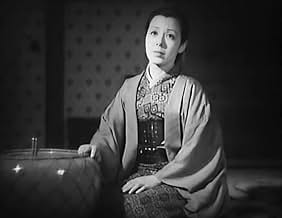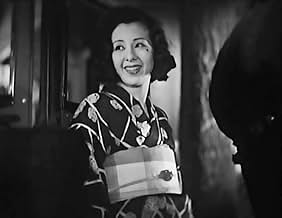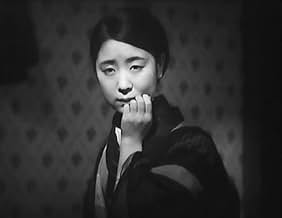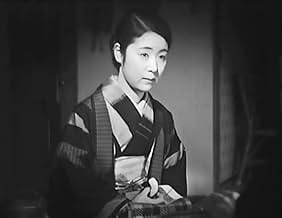Tôkyô no onna
- 1933
- 47 मि
अपनी भाषा में प्लॉट जोड़ेंRyoichi and Chikako are brother and sister. They live together. Chikako works during the day in an office and at night she prostitutes herself to fund her brother's studies at the university... सभी पढ़ेंRyoichi and Chikako are brother and sister. They live together. Chikako works during the day in an office and at night she prostitutes herself to fund her brother's studies at the university. Ryoichi doesn't know about his sister's secret life, but he is dating Harue whose brothe... सभी पढ़ेंRyoichi and Chikako are brother and sister. They live together. Chikako works during the day in an office and at night she prostitutes herself to fund her brother's studies at the university. Ryoichi doesn't know about his sister's secret life, but he is dating Harue whose brother is a policeman.
फ़ीचर्ड समीक्षाएं
There are many things to enjoy in "Woman of Tokyo" (the plot and the acting, to start with), but first of all it is an interesting film for all those who would like to see en early elaboration of Ozu's style, especially in his use of domestic setting and confined, interior shots. There is also an overt tribute to Ernst Lubitsch (much admired by Ozu) with a full-frame excerpt from Lubitsch's short film entitled "The Clerk" taken from "If I Had a Million". Ozu will get only better and better after this "Woman of Tokyo".
Ryoichi (Ureo Egawa) is a university student whose sister, Chikako (Yoshiko Okada), supports him by working at an office and helping a professor with his work in the evening. Ryoichi has a girlfriend, Harue (Kinuyo Tanaka), who lives with her brother, Kinoshita (Shinyo Nara). Everything is right in the world until a policeman shows up at Chikako's work without explanation, asking to look at her employment records, and rumors start swirling.
Now, Ozu's obviously been dealing in social commentary for a few years, but this is something that borders on odd to me: gossip. It's probably a cultural thing. Japan is much more of a shame culture, so gossip can probably more easily destroy people's lives than I imagine. Still, it's a film about rumors completely upending someone's life. And I do mean completely.
The rumor is that Chikako isn't helping a nice old professor with his research. She's working at an illicit club that sells alcohol. It's not the kind of work for a good, young woman.
The drama is around the rumors going from Kinoshita to Harue to Ryoichi, and Ryoichi taking it very, very badly. It gets worse when he finds out that the rumors are true.
So, the movie shifts from gossiping to shaming nature of Japan dealing with women who don't act right. That's interesting, but it's a shift that I don't think quite works. The film is a drama from beginning to end, so we don't have light comedy to buoy us through the first motions of thin plot. It's also really short, so the view of life before the changes are a bit thinner than they probably need to be.
And that shortness combines poorly with the film's moves in its final act. Ryoichi gets really mad at Harue for besmirching his sister, and then he gets completely destroyed when he finds out it's true. And he makes a choice that no one in an Ozu film would ever make, sending the film deep into melodrama territory.
The film still looks like an Ozu film with people quietly examining the changing nature of things, but the emotions are so out in the open and even, I struggle to say it this way since the actual dramatic point is actually quite large, overdone that it just ends up playing out like thin melodrama. Which is really weird to say in an Ozu film where third acts are where the films go to quiet down and become introspective. It's a weird mix that doesn't mesh well, and it does indicate a quick turnaround on the film. More time, and Ozu probably would have changed things to more closely align with his storytelling ethos.
So, I am less than enthused with this film not because it doesn't align with Ozu's narrative conventions, but because the direction he takes the film just doesn't work. It's overwrought instead of affecting. I don't have a natural aversion to melodrama. Filmmakers can do it quite well (Masaki Kobayashi had a few very good examples in his filmography), but this is one where I just ended up disconnecting in the end.
More importantly, in the line where the title character calls her brother a coward, we get what seems to be a criticism of traditional honor and the role of shame in Japan. This woman is such a loving sister in the opening scene, works hard in the office, and sacrifices herself at night to provide money for her brother so that they can have a better life, in a pragmatic and poignant way - something I wish Ozu had explored - and then he can't handle just knowing about it, because of what it might do to the family's reputation.
The fact that we get a scene of the American film If I Had a Million (1932) is certainly meaningful - if this poor woman had a million dollars, she wouldn't be selling herself, and none of this would have happened. Together with the three reporters snooping around like happy jackals afterwards, not beginning to scratch the surface of the truth while rushing to get their stories off to print, there is some nice commentary about the desperate, sad lives in a city, unknown to others. I just wish the film had a little more depth to it, but it's not a bad way to spend 47 minutes.
क्या आपको पता है
- कनेक्शनFeatured in Konbini: Pablo Larraín va faire un remake de Scarface? | Video Club (2025)
टॉप पसंद
विवरण
- रिलीज़ की तारीख़
- कंट्री ऑफ़ ओरिजिन
- इस रूप में भी जाना जाता है
- Woman of Tokyo
- उत्पादन कंपनी
- IMDbPro पर और कंपनी क्रेडिट देखें
- चलने की अवधि47 मिनट
- रंग
- ध्वनि मिश्रण
- पक्ष अनुपात
- 1.37 : 1
इस पेज में योगदान दें























